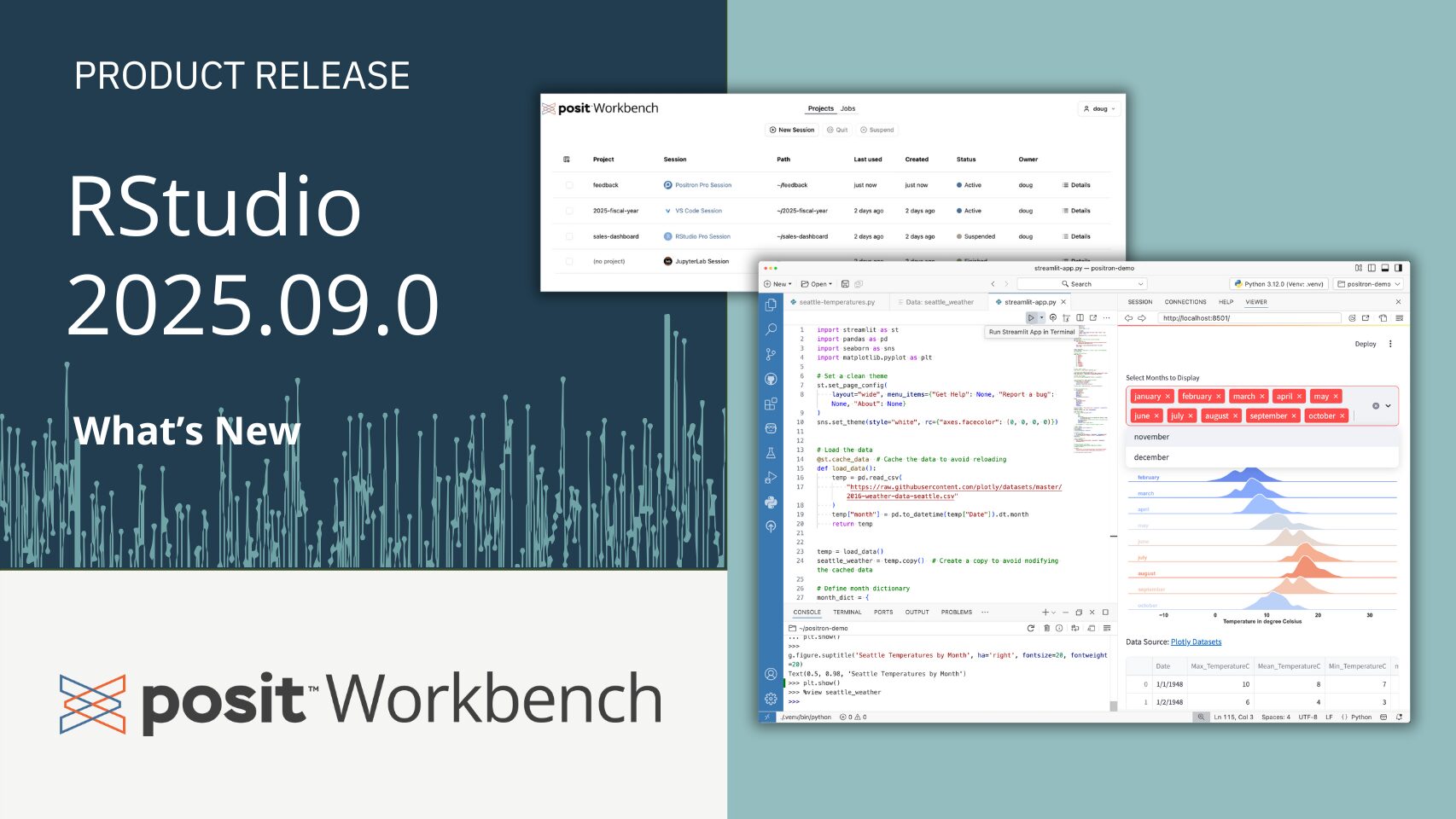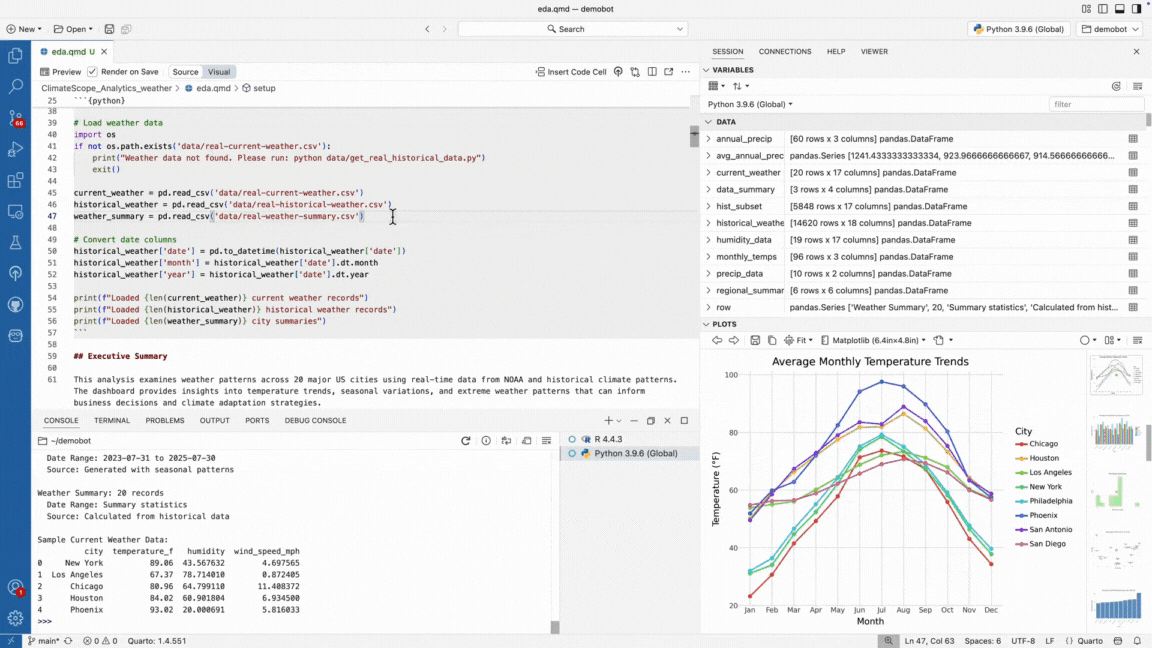RStudio IDE and Posit Workbench 2025.09.0: What’s New

We’re excited to announce the latest update to Posit Workbench, Positron, and RStudio, code-named “Cucumberleaf Sunflower.” We’ve designed this release to deliver tangible improvements to your daily data science work: ensuring the reliability of critical analyses, improving collaboration across languages, simplifying complex reporting, and making infrastructure management more intuitive.
This post highlights some of the improvements in the latest release. You can find more details in the Release Notes.
Positron is now generally available!
Positron is our next-generation data science IDE and is now generally available on desktop for free and as part of Posit Workbench as a supported IDE type as part of your existing subscription!

For more information about Positron, please see the Positron announcement blog post, the Positron user guide, or the Positron Pro on Posit Workbench user guide.
If you are wondering about RStudio, please don’t worry – it’s not going away! RStudio includes 14+ years of R focused optimizations and we are committed to maintaining and updating RStudio. For more information, please read the FAQ for RStudio users.
For Workbench administrators, as part of moving Positron Pro out of preview support on Workbench, we have now set new defaults for the Positron Pro configuration files, including Positron Pro sessions as enabled by default. This default can be controlled by individual Posit Workbench administrators. Posit Workbench will back up and store any existing configuration files and apply the new defaults as a one-time upgrade process. This automatic backup protects your existing customizations and provides production-ready defaults to ensure a stable, non-disruptive upgrade.
During package upgrade, the following files will be backed up if they exist:
/etc/rstudio/positron.confas/etc/rstudio/positron.conf.bak/etc/rstudio/positron-user-settings.confas/etc/rstudio/positron-user-settings.conf.bak
After completing the package upgrade, carefully review the backed-up files and the new default configuration files and merge any customizations as needed.
Positron Pro sessions are currently supported on RHEL 9 and Ubuntu 22/24. We plan to add additional platform support, including RHEL 8 support, in future releases.
RStudio
Quarto 1.7 support
RStudio now comes bundled with Quarto 1.7.32, which includes many new features for creating more consistent and accessible reports. For full details, please refer to the Quarto 1.7 announcement.
An initial highlight is better support for light and dark modes via brand.yml:
- Dark Brand: Light and dark brands can be specified for a document or project, enabling dark mode via brand.yml.
- renderings: Plots and tables can have light and dark renderings.
You can now specify light and dark themes via brand, map computational outputs to themes, and have your website theme follow your viewer’s preference.

In case brand.yml is new to you, it is a simple, portable YAML file that codifies your company’s brand guidelines into a format that can be used by Quarto, Python and R tooling to create branded outputs. Our goal is to support unified, branded theming for all of Posit’s open source tools—from web applications to printed reports to dashboards and presentations—with a consistent look and feel.
RStudio + Package Manager integration
RStudio desktop, RStudio server, and RStudio Pro on Workbench will now optionally display CVE-related metadata in the Packages pane when configured against Posit Package Manager. This helps developers make safer package choices at a glance and helps IT teams simplify security reviews. For example, version 1.6 of the commonmark package has a number of known vulnerabilities. If that version of the package is installed, RStudio displays a small warning icon in the Packages table for that package:


Additionally, RStudio Pro on Posit Workbench will allow administrators of Workbench and Package Manager to define custom metadata for inclusion in the packages pane. Custom metadata lets your team define arbitrary key-value pairs and assign them to one or more packages in a specific source or repository. This feature allows IT to share critical package information—such as validation status or usage guidance—directly within the developer’s environment.
In practice, examples of this might be risk or other assessment scores, additional documentation links, compliance or governance tags, or other arbitrary data in addition to the core metadata packages already exposed.
For more information, please refer to the Admin Guide section on Additional package information.
Custom metadata performs faster with a large number of packages with Posit Package Manager >2025.09.0, and we highly recommend upgrading to that release to make use of this integration. Package Manager custom metadata associated with a package is disabled by default, but you can enable it. For information on custom metadata and how to enable it, see the Custom metadata section of the Package Manager Admin Guide.
Quality of life improvements
- (#16213): Improves legibility of highlighted code when RStudio debugger is active
- (#15945): Adds a user preference to disable showing the splash screen at startup
- (#15919): RStudio now uses lobstr when computing object sizes
- (#16138): RStudio now supports version 17 of the R graphics engine
Accessibility
- Fixed a WCAG 1.1.1 violation (unlabeled image in the Console toolbar) by marking it as cosmetic. [Accessibility] (#15757)
- Fixed Material theme’s colors for selected word or text highlighting so they are more visible. [Accessibility] (#15753)
Deprecated / Removed
- (#15940): RStudio Server and Posit Workbench are no longer supported on Ubuntu Focal
- (#16104): Removed the “Limit visible console output” feature
- (rstudio-pro#8257): Removed publishing to Posit Cloud
- (#16233): Removed the “Send automated crash reports” feature from RStudio Desktop
Posit Workbench
Quality of life
- We have added support for just-in-time provisioning of local groups for Proxied Auth, OpenID Connect, and SAML Authentication in Workbench
- Added the kapa.ai website widget to Posit Workbench documentation to answer questions about deploying, configuring, and using Workbench, Posit Connect, and Posit Package Manager.
- Added support for SLURM 24 and 25
- Added support for RHEL 10
Project-oriented homepage
We have updated the Posit Workbench homepage with a new design focused on project-based workflows to help you find and launch your work more quickly. This update also supports opening Positron project folders directly from the homepage.

After logging in, the Posit Workbench home page contains two sections (tabs) for project, session, and job management:
- Projects tab contains a table of projects and their sessions.
- Jobs tab contains a table of Workbench Jobs and/or Audited Jobs
In the new homepage, you can launch the various IDE types against a specific project folder, reducing the chances of accidentally creating a blank session and thus needing to relaunch the session a second time.
In future releases, we plan to further refine the homepage to include more project-specific configuration and metadata. We also know change can be hard, so we have included the option to switch back to the legacy homepage in Posit Workbench 2025.09.0. In a future release, we will completely remove the deprecated legacy homepage.
Enhanced Prometheus metrics for monitoring
We have added to our exposed Prometheus metrics to provide comprehensive visibility into system performance, resource utilization, and user experience. This release also moves our Prometheus metrics out of preview and into general availability.
These metrics enable platform teams to translate system performance into actionable insights for cost management and resource planning. By monitoring everything from the number of active or failed sessions, usage, and job durations, to IDE startup latency and CPU or memory usage, these metrics enable platform teams to optimize costs, ensure reliability, and scale resources effectively while integrating seamlessly with existing observability and Application Performance Monitoring (APM) tools.
Session Auditing Logs and Chronicle integration
We have also added an optional internal Audit Database to store historical data about sessions and product usage. In contrast to Prometheus metrics that are intended for real-time analysis, the audit details provide fine-grained details about individual sessions. This includes which user launched the session, the IDE selected, the overall session duration, launch parameters such as the Resource Profile, resources requested, or specific Docker image, and many other details. The full list of available data is available in the Audit Data Dictionary. Additionally, relevant data can be ingested into Posit Chronicle for easier queries. Chronicle helps data science managers and other stakeholders understand their organization’s use of supported professional products (Posit Connect and Posit Workbench).
The Session Auditing data can be used for traditional compliance and auditing needs to manage risk, but can also better answer questions about product usage. Two examples are covered in greater detail in our recent blog post on Usage data in Posit Team and below.
Chargebacks:
Session duration logs also help with chargeback scenarios across multiple internal business units. For example, one large US government department has teams across internal business units using Posit tools. The CDO’s office prefers for each business unit to pay towards the overall cost according to their level of usage. These new Workbench session-level auditing metrics enable this use case.
Behavioral analysis for optimization:
On Workbench, user-level logs assist with answering behavioral questions about the popularity of specific IDEs, typical resources selected, and environment images in use, helping teams
- optimize resource profiles for various kinds of users or groups, so each group stays productive while not over or underutilizing computational resources
- adopt the right environments by deprecating unused images, migrating to approved R/Python versions, and more, all to help you stay compliant and move forward
Miscellaneous
- Allows strict enforcement of the user limit specified by the Posit Workbench product license
- Fixed an issue where Shiny for Python and other applications would reguarly experience websocket failures in VS Code and Positron sessions.
- Many improvements to Workbench Jobs launched from VS Code or Positron Pro.
Deprecated
As mentioned in the Workbench 2024.09.0 blog post, we are prioritizing JupyterLab for Jupyter sessions and deprecating Jupyter Notebook Classic sessions as a result of Jupyter core’s focus on JupyterLab. As a reminder, JupyterLab supports opening and authoring of Jupyter Notebooks. JupyterLab is also a better fit for using Jupyter Notebooks on Posit Workbench, given the more advanced and full-featured IDE experience compared to Notebook Classic.
Lastly, Jupyter notebooks can be authored and executed in Positron, and we are currently working to further enhance the notebook UI and experience inside of Positron.
- (#15940): RStudio Server and Posit Workbench are no longer supported on Ubuntu Focal
- (#16104): Removed the “Limit visible console output” feature in RStudio
- (rstudio-pro#8257): Removed publishing to Posit Cloud, future investment will go towards supporting Posit Connect Cloud
- (#16233): Removed the “Send automated crash reports” feature from RStudio Desktop
- (rstudio-pro#8776): With the release of the new Workbench homepage, the legacy Workbench homepage is now considered deprecated and will be removed in a later release
Build updates
RStudio
- Copilot Language Server 1.352.0
- Electron 37.2.6
- GWT 2.12.2
- Quarto 1.7.32
Workbench
- Updated Node in PWB Code Server and Positron Pro sessions to 22.15.1
- Nginx 1.29.1
- Positron Pro 2025.08.1-11
Learn more
There’s a lot more in this release, and it’s available for download today. You can read about all the features & bug fixes in the Posit Workbench and RStudio 2025.09.0 “Cucumberleaf Sunflower” release in the RStudio/Posit Workbench Release Notes. We’d love to hear your feedback about the new release on our community forum.
To be notified of product updates, patches, etc., please subscribe to the Products email list from the Posit Subscription Management page.

